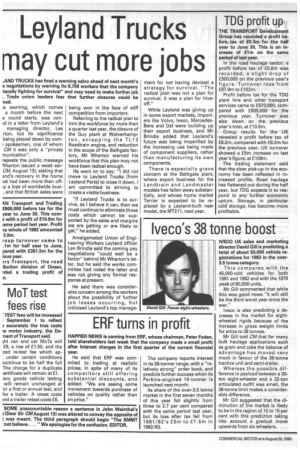Leyland Trucks may cut more jobs
Page 6

If you've noticed an error in this article please click here to report it so we can fix it.
AND TRUCKS has fired a warning salvo ahead of next month's e negotiations by warning its 9,700 workers that the company iterally fighting for survival" and may need to make further job . Trade union leaders fear that further closures could be ned.
e warning, which comes a month before the next e round starts, was conKJ in a letter from Leyland's managing director, Les rton, but its significance being played down by corn/ spokesmen, one of whom CM it was only a "private munication".
repeats the public message Vharton issued a week earCM, August 13), stating that 3nd's recovery in the home (et had been more than off)y a loss of worldwide busi, and that British sales were being won in the face of stiff competition from importers.
Referring to the radical plan to trim the workforce by more than a quarter last year, the closure of the Guy plant at Wolverhampton, scrapping the TL1 2 Roadtrain engine, and reduction in the scope of the Bathgate factory, Mr Wharton warned his workforce that this plan may not have been radical enough.
He went on to say: "I did not move to Leyland Trucks [from Leyland Parts) to close it down. I am committed to striving to create a viable business.
"If Leyland Trucks is to survive, as I believe it can, then we must continue to eliminate those costs which cannot be supported by the safes and margins we are getting or are likely to get," he added.
Amalgamated Union of Engineering Workers Leyland officer Len Brindle said the coming pay negotiations "could well be a factor" behind Mr Wharton's letter, but he said the works committee had noted the letter and was not giving any formal response at present.
He said there was considerable concern among the workers about the possibility of further job losses occurring, but criticised Leyland's top manage ment for not having devised a strategy for survival. "The radical plan was not a plan for survival. It was a plan for hiveoff."
While Leyland was giving up in some export markets, importers like Volvo, lveco, MercedesBenz and Daf were building up their export business, and Mr Brindle added that Leyland's future was being imperilled by the increasing use being made of component suppliers, rather than manufacturing its own components.
There is especially grave concern at the Bathgate plant, where export business for the Landtrain and Landmaster models has fallen away substantially, and whose home market Terrier is expected to be replaced by a Leyland-built new model, the MT211, next year.
















































































